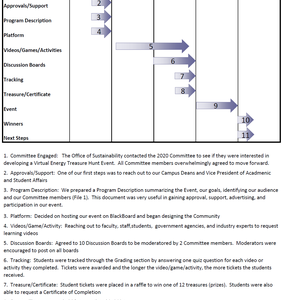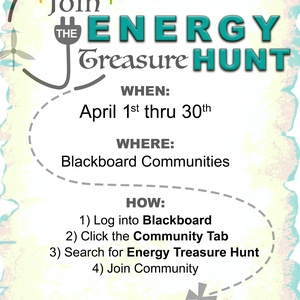Virtual Energy Treasure Hunt Event
Suffolk County Community College
Project Overview
In April 2021, Suffolk County Community College hosted our first US Department of Energy (DOE) Energy Treasure Hunt Event. The DOE describes the Treasure Hunt as “One of the best tools at an energy manager's disposal”. It invites the organization’s employees to take part in energy audits to find energy saving improvements. The DOE Treasure Hunt is typically a 3 day event that involves training, audits, and a program summary. However due to COVID, we hosted a virtual treasure hunt event. Our dedicated, enthusiastic Committee members, reached out to faculty, staff, local government, utility and industry experts asking if they would be willing to share energy saving videos. The main focus was energy savings but it was expanded to include climate change, electric vehicles, water savings and recycling/reuse to name a few (Complete Video list is shown in File 2). Our Energy Treasure Hunt event included 13 videos, 1 game, 4 activities (Game and Activities list is in File 3) and 10 discussion boards (File 3). After watching a video or completing a game or activity, students answered a one question quiz to receive tickets. At the end of the event, tickets were selected randomly and treasure/prizes were awarded (Treasure/Prize list is shown in File 3). Students could also request a Certificate of Participation (File 3).
Background
The College began an Energy Conservation program in 2014 by partnering with Cenergistic in a behavioral based energy savings program. The Cenergistic partnership ended in 2020 but the College continues the Energy Conservation Program. In an effort to communicate the program in a positive way to the College community, the Office of Sustainability continues to try different avenues. During a DOE Better Buildings webinar on their Energy Treasure Hunt initiative, the staff agreed that they could attempt this event at the College. Planning began in 2019 with a live event scheduled for April 2020 but was curtailed by COVID. The Office of Sustainability was still interested in hosting an Energy Treasure Hunt event and in January 2021, reached out to the 2020 Committee members. All the Committee members were excited about attempting a virtual event and agreed to help plan it.
Goals
Our goals for our Energy Treasure Hunt Event were:
- To highlight and explain the College’s Energy Conservation Program to the College community.
- To create a sense of ownership and teamwork among the College community by allowing the College community the opportunity to be involved in identifying and suggesting energy saving tips and building a culture of continuous improvement.
- To advance our partnerships with the utilities and continue to work on reducing our energy use.
- To highlight the College’s commitment to being a positive leader in reducing our carbon footprint.
- And last but definitely not least through the training exercises, help to reduce our energy use not only on campus but in our community.
Implementation
The Virtual Energy Treasure Hunt event began April 1 and ended April 30, 2021. The Committee included faculty/staff in Biology; Earth and Space Sciences; Natural Sciences, Theater Arts; Plant Operations; Office of Sustainability; Campus Activities/Leadership Development; and the College Foundation. We began by requesting approval from Administration and were pleased with their enthusiastic support. Using our 2020 model, we developed a list of organizations, staff and agencies we would contact for energy saving videos. Initially we were requesting videos on energy savings. As the planning progressed, we expanded the program to include climate change, electric vehicles, the students’ Environmental Club solar tree initiative, solar panels, water savings and recycling/reuse. The Committee decided to use BlackBoard as our platform and began strategizing on the best ways to advertise and drive participants to the site. The Committee suggested developing an online flyer which would be useful to advertise the event and asked our Graphics Arts Department to help with the design (Image 1). With the support of Administration, the event flyer was presented in College Briefs, Weekly Campus Briefs, posted online on the Student Activities page, included in the College and Office of Sustainability Facebook and twitter, and emailed to Campus Deans, Science faculty, interested staff. Ten Discussion Boards (File 3) were included and each Discussion Board had two Committee members assigned as moderators. To reward students for their participation, raffle tickets were given to students who completed the quiz question or completed the game or activity. We offered twelve prizes ranging from $20 to $50 and winners were randomly selected. Additionally, some professors offered extra credit to students participating in the event. Students were also able to request a Certificates of Participation. The event ended on April 30th and prizes were awarded on May 3rd.
Timeline
Please see Image 2.
Financing
The Event costs were less than $100 and that was used to purchase a few treasure/prizes for the students. The Committee members donated the other prizes.
Results
Nearly 100 students participated in the event with actual numbers following:
- 86 students attended the event and answered quiz questions
- Students, faculty and staff participated in the Discussion Board with anywhere from 2 to 34 participants on a board. Total board participants was 113.
- Some faculty when they heard of the event, asked to be involved in future events.
- The Committee developed relationships with organizations that we will continue to collaborate with in future programs.
- The Event also provided the motivation to seek additional charitable support for the student-run Sustainability and Environmental Club’s interest in advancing solar energy on the Ammerman Campus. Students are undertaking a fundraising initiative to identify donors to support the acquisition and installation of a Solar Tree on the Veterans Memorial Plaza of the Ammerman Campus. Students are engaging faculty, staff and the fundraising team at the Suffolk Community College Foundation to identify and engage prospective donors interested in advancing alternative energy and sustainability in our community.
Lessons Learned
- High level support was necessary in promoting the event. We were fortunate to have College Briefs and Weekly Campus Briefs announcing the event as well as social media outlets (File 3 – Social Media).
- Selecting a good Committee is essential - Choose your committee to include an enthusiastic, dedicated group. We selected staff that were involved and interested in the subject.
- Will start a month or two earlier
- The event was well received by the College. The Committee agreed to keep the online event videos, game, activities and discussion boards active for the coming semesters. Also, the Committee committed to hosting both an online and live event next April.
- The event is easily replicated and updated. It can be tailored for new goals and can highlight current topics.
- Will need to identify a platform that will be more easily accessed by staff
- Discussion Boards were very active and it was helpful having Committee members not only monitor individual boards but be able to provide responses on all boards. It was a very positive sharing experience.
- Even with virtual overload, students were extremely enthusiastic and actively participated in the event. They are very passionate about conserving energy and resources. In conclusion, Here is a short sample of what some of our students had to say:
- “I did the energy audit and realized the biggest issues within my home are the energy vampires and lack of energy efficient appliances. We recently upgraded our fridge, but are still in the process of replacing the rest of our appliances and air conditioners. After doing the audit, we're all being more mindful to unplug things we're not using! We're very good at not turning the lights on in the house until it gets dark out and turning lights off when rooms aren't in use, but I think with the upgrades and unplugging, my audit will look very different soon!”
- “I was never a big person on recycling; I lived on the impression that the reason we recycled was to make money and thought of why a person would require an old paper of mine or a bottle I drank from made no sense; nonetheless, I did constantly recycle at home because it mattered to my family. Now I regret that ideology on recycling and wish I considered the trees wasted with every paper I ripped when I made a mistake. Since I watched the video (Town of Islip Recycling Program), I was intrigued to make my own paper and start crafting my own designs with the stuff I have at home. People don’t look into that there is so much stuff they can make with the right idea and instructions that could save money but inspire creativity…”
- “During the “Our Water Our Lives” video, I discovered some helpful tips that I overlooked or wasn’t aware of about water. I learned that I wasn’t just wasting water, I was actually drowning my plants, by watering the top of them, rather than at the root. I also learned the importance of compost when it comes to plants, it carries nutrient and holds moisture that’s valuable to plants and helps save water.”
- “I learned a lot from the Electric Vehicle 101 video, my goal that am going to work towards is to own a Tesla Model X.”


